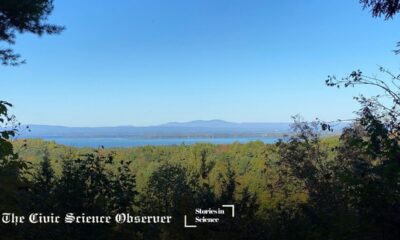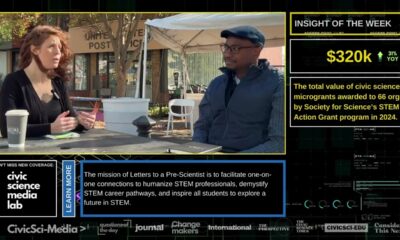Stories in Science Special Series
Discovering the Scientist Within Me

– Stefanie Morgan –
– Doctoral Student in Cancer Biology at Stanford University –
[dropcap]T[/dropcap]he first time I met a scientist was in college. Prior to then, science seemed just an abstract concept that was reserved for the unusually intelligent. As a student at the local community college who’d fallen through many educational cracks and lacked a real high school diploma, I didn’t consider myself particularly intelligent. Further, as the first person in my religious and strongly traditional family to attend college, my choice to pursue formal higher education of any kind – especially to take science classes – was not strongly encouraged.
Full of self-doubt and uncertainty about whether I belonged in college, I was quite anxious about the introductory Biology class. I was quite certain everyone else knew far more than I did. But the course was required so there was no choice but to do it. Within a few short weeks, I was so glad that I’d enrolled in the class, because I got to explore magical biological processes I’d never heard of before. The course unveiled new worlds of vast wonder that got me engrossed in science. When the class was over, I looked for more classes in all areas of science that I could find, exploring psychology, chemistry, anatomy, statistics, and more. I learned that it didn’t take a genius to understand and excel in these fields. One simply needed to have a genuine curiosity about life.

Stefanie Morgan
This interest in science sparked an enthusiasm for academia broadly, and I fell in love with education. I finished community college, transferred to a small 4-year state school, and studied both psychology and biology given my fascination with figuring out the underlying workings of the brain. I discovered the writings of Dr. Oliver Sacks, and spent many late nights between the jobs that paid for my classes reading the wild tales of Dr. Sacks’ medical adventures.
Within a few months at the 4-year college, a professor asked us if we were interested in joining her research group. Having no idea what this was, I went to find out. It was a choice that would change my life. If science was fascinating, research was incredible! I could manipulate finer processes of the concepts I’d studied in textbooks, and discover new truths about the dynamic environment. I could share these findings with others at meetings and in presentations, and teach others about the amazing scientific discoveries I’d found. It was a dream!
After graduation, it was a struggle to figure out how to stay in science and do the “right” version of what I loved. The questions plagued me constantly: Did I want to complete more schooling? Should I be a nurse, a doctor, a researcher, or something else entirely? Was I even appropriately prepared for any of these things? Without family members experienced in these matters to advise and guide the way, the beautiful freedom of academia became overwhelming. I pondered deeply as I struggled to identify the best choice, and to prove to my family that I hadn’t made a wild, foolish, and slightly expensive mistake in going to college for a degree in two science fields. I knew I did not want to wait tables and tend bar forever. I knew I liked research. Slowly, I came to recognize I really loved research, and the choice became instantly clear – I could become a researcher! It would take a bit more work, but this did not frighten me. And when I was done, I would be a scientist forever.
The only thing the stood in the way of pursuing a career as a scientist was my anxiety about failing in the process. I had surprised myself with how well I’d done in school so far, but the sneaky fear that I’d reach my intellectual limit was always lurking. Though others saw me as a bright and talented young woman, I saw myself only as a poor small-town kid without a high school diploma. “Eventually they’ll find out I’m not that smart, and they’ll realize they made a mistake in letting me in,” I’d always think. So, instead of jumping in head-first, I chose to test the waters.
Never be afraid to push your limits and explore new paths in science. It will be an extraordinary and life changing experience that might someday lead you to also be able to say, “I am a scientist.”
I figured could be a science assistant to a more senior scientist. Why? Well, I knew that the experience would allow me to see what the life of a scientist was like, and also to determine how I would fit in with real life scientists. The experience would allow me to determine whether I could keep up with them at all. It was also a good way to get more research experience, which I would need if I was to embark upon a career in science.
This was the second life changing decision about science I made. Even as a junior scientist, I was a scientist. I got to go to the hospital and receive samples from cancer patients, bring them back to my bench and analyze them to figure out how to best treat and save the life of this living person just a few hundred feet away. It was everything I hoped and more.
As a junior scientist, I quickly realized I wanted to be a senior scientist. This meant I needed to get a doctorate. This seemed like a huge and committed step for someone whose relatives held only high school diplomas. Again, the fear of failure reared its ugly head. What if I wasn’t qualified enough to get into a doctoral program? I was coming from a small state school. How could I ever compete with students from fancier schools who had access to more opportunities and resources? And how would I ever afford 5+ more years of school?
I expressed my fears to my research mentor. She actually laughed! She assured me that I was every bit as qualified. May be even more qualified! She also explained that doctoral programs in science were almost always free, and they in fact paid you to go. So, I applied. At her urging, I included Stanford in the list of applications. No one was more shocked than I when the acceptance letter came. Here was going to be a whole new world of anxiety, potential failure, but also an enormous opportunity. I could not only become a fully-fledged scientist, but I had an opportunity to become one of the top scientists in my field. I moved across the country with two suitcases and began my journey to becoming a scientist in earnest.
Though my time at Stanford has not always been easy, I have had opportunities beyond my wildest imagination. Fear of failing relative to my extremely well-educated peers has reared its ugly head often. For example, in my first week of classes at Stanford, I learned a few of my classmates had worked with the teams that had made extremely notable breakthroughs with CRISPR technology just a few months earlier. I hadn’t even heard of CRISPR, and was far too embarrassed to ask. Everyone else clearly knew exactly what it was. Events like this piled up quickly in my first months of graduate school. Before long, I was sure Stanford was going to realize they made a mistake in admitting me and send me back home before the first year was over. Fortunately, they didn’t, and I studied harder than ever to catch up to my classmates in-order to build my knowledge base to match theirs. I’ve taken advantage of every opportunity, and often remind myself to push through when things are not going my way, because often the greatest reward lies just on the other side of the difficulty.
Though I never received a high school diploma, in a few short months I will receive a Ph.D. from Stanford University. It is extremely exciting to be on the frontier and explore the unknown aspects of science. I am honored to be able to share my exploration with others. Without overcoming the initial fear and trying something new, I would never have gotten this opportunity. My advice? Never be afraid to push your limits and explore new paths in science. It will be an extraordinary and life changing experience that might someday lead you to also be able to say, “I am a scientist.”
Publications from Stefanie L. Morgan
Morgan SL, Mariano NC, Bermudez A, Arruda NL, Wu F, Luo Y, Shankar G, Jia L, Chen H, Hu J, Hoffman AR, Huang C, Pitteri SJ, Wang KC. 2017. Manipulation of nuclear architecture through CRISPR-mediated chromosomal looping. Nat Communications, 8:15993. doi: 10.1038/ncomms15993.
Morgan SL, Seggio JA, Nascimento NF, Huh DD, Hicks JA, Sharp KA, Axelrod JD, Wang KC. 2016. The phenotypic effects of royal jelly on wild-type D. melanogaster are strain-specific. PLoS One. 11(8): e0159456. doi: 10.1371/journal.pone.0159456. PMID: 27486863
Luo Y, Morgan SL, Wang KC. 2016. PICSAR: Long non-coding RNA in cutaneous squamous cell carcinoma. J Invest Dermatol. 136(8):1541-2. doi: 10.1016/j.jid.2016.04.013. PMID: 27450499.
Morgan SL, Medina JE, Taylor MM, Dinulescu DM. 2014. Targeting platinum resistant disease in ovarian cancer. Curr Med Chem. 21(26):3009-20. PMID: 24735363
Morgan SL, Wyant GA, Dinulescu DM. 2013. “Take it up a NOTCH”: novel strategies for cancer therapy. Cell Cycle. 12(2):191-2. doi: 10.4161/cc.23375. PMID: 23287472.
McAuliffe SM*, Morgan SL* et al. 2012. Targeting Notch, a key pathway for ovarian cancer stem cells, sensitizes tumors to platinum therapy. Proc Natl Acad Sci U S A. 109(43):E2939-48. doi: 10.1073/pnas.1206400109. PMID: 23019585.
*Authors contributed equally to this work
Highlighted articles featuring recent publication:
Nature Methods: go.nature.com/2iNJPsk
Stanford Medicine SCOPE: shar.es/1TpCv8
SBI Marketing: https://www.systembio.com/crispr-cas9-systems/cloud9-gene-expression-regulation
Cover image by Avi Chomotovski from Pixabay | CC0 Creative Commons
The CS Media Lab is a Boston-anchored civic science news collective with local, national and global coverage on TV, digital print, and radio through CivicSciTV, CivicSciTimes, and CivicSciRadio. Programs include Questions of the Day, Changemakers, QuickTake, Consider This Next, Stories in Science, Sai Resident Collective and more.

-
 Audio Studio1 month ago
Audio Studio1 month ago“Reading it opened up a whole new world.” Kim Steele on building her company ‘Documentaries Don’t Work’
-
Civic Science Observer1 week ago
‘Science policy’ Google searches spiked in 2025. What does that mean?
-
Civic Science Observer1 month ago
Our developing civic science photojournalism experiment: Photos from 2025
-
Civic Science Observer1 month ago
Together again: Day 1 of the 2025 ASTC conference in black and white
Contact
Menu
Designed with WordPress
























